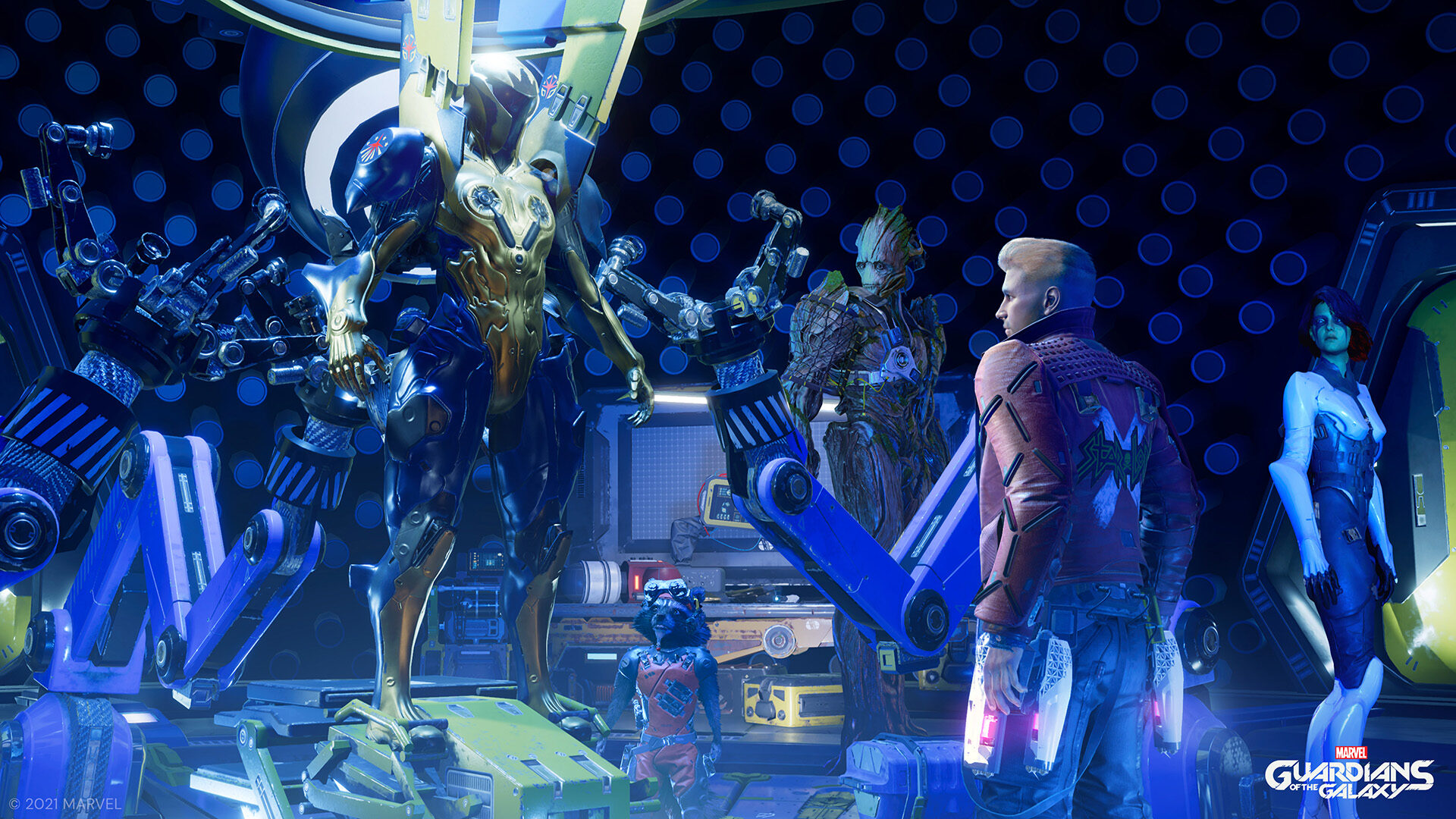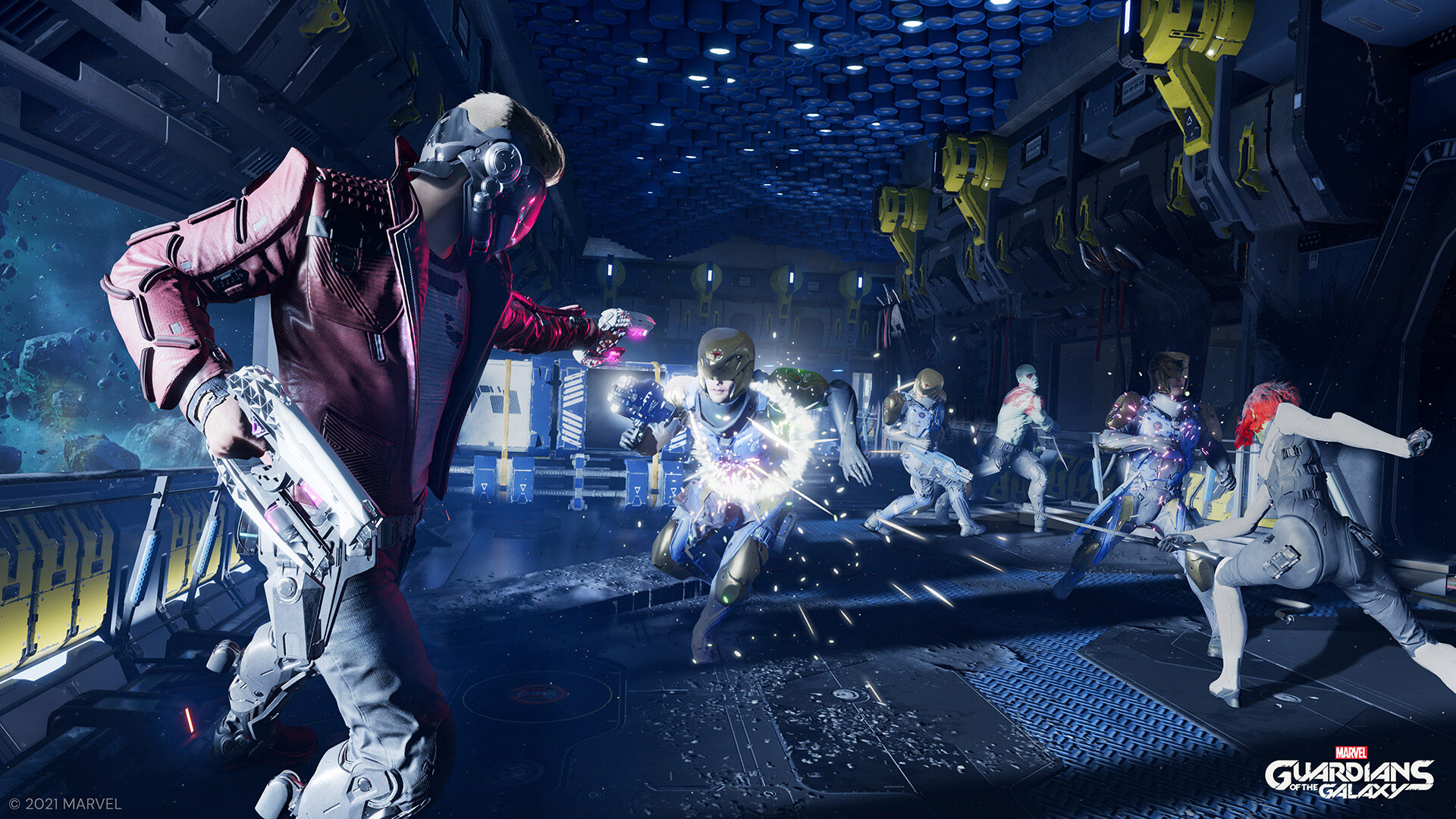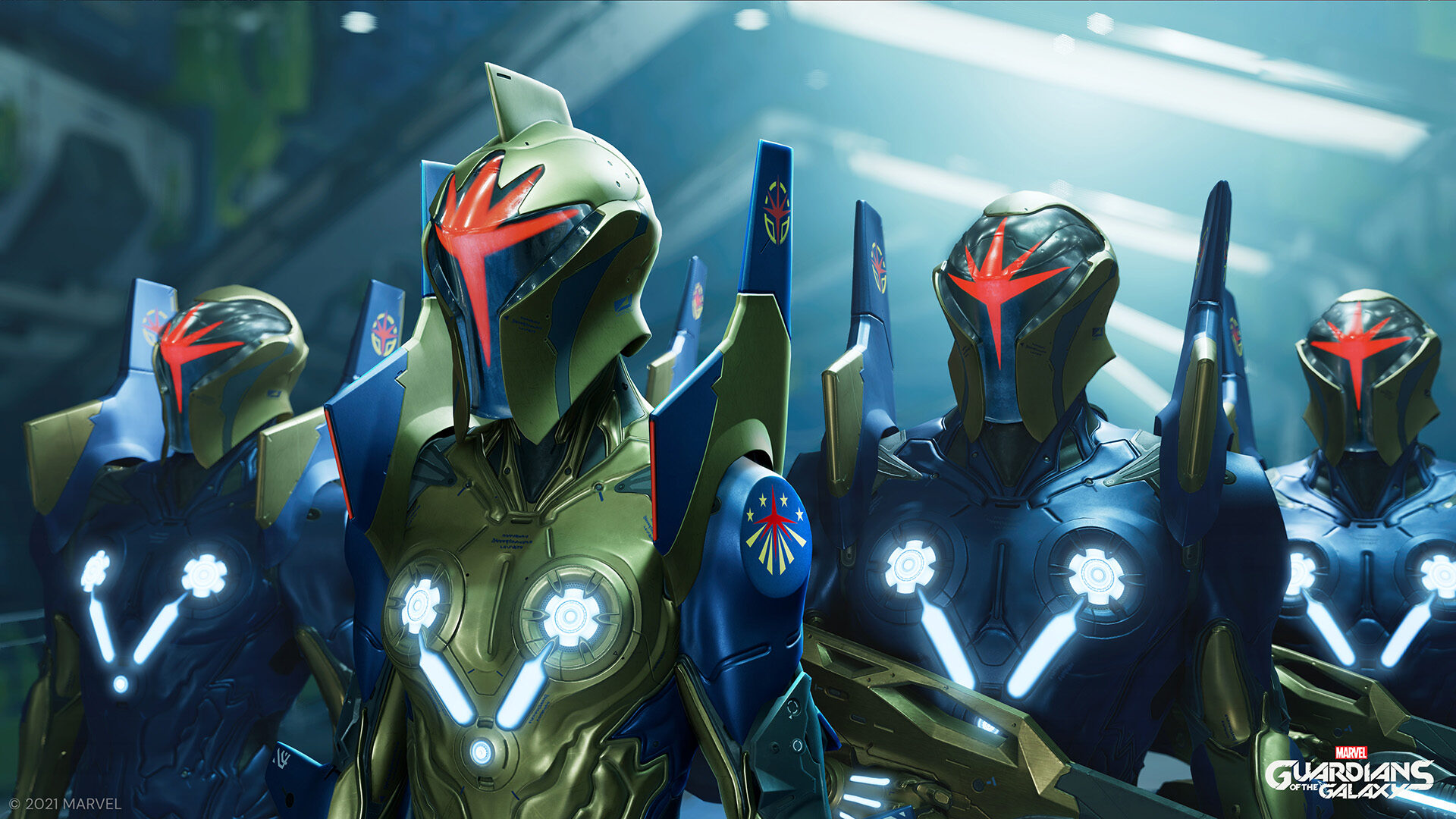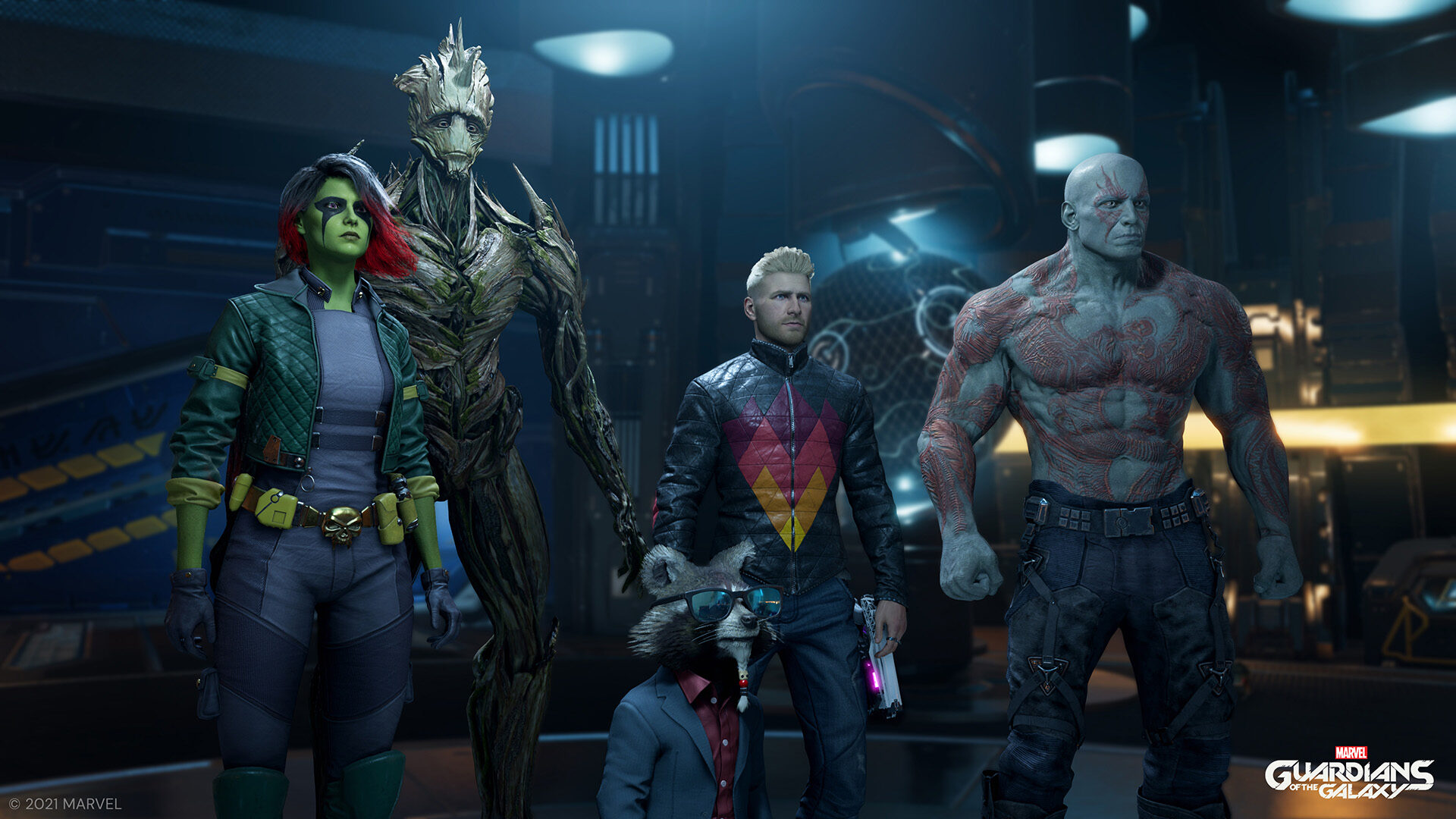I’m going to level with you. Before James Gunn brought the Guardians of the Galaxy to the Marvel Cinematic Universe in 2014, I don’t think I could’ve told you a single thing about them. I grew up reading comics and watching superhero cartoons, but like many people, the spacefaring team of Peter Quill (aka Star-Lord), Gamora (Thanos’ daughter), Drax (the Destroyer), Groot (a living, walking tree), and Rocket Racoon (pretty much all in the name) were just too deep a cut.
That’s probably why Eidos-Montréal, in giving these characters their own original action game, have decided to hew rather closely to Gunn’s overall tone. After going hands on with a preview build of Marvel’s Guardians of the Galaxy, it’s clear that the biggest touchstones are all cinematic: big combat beats where the characters team up in memorable ways, a soundtrack full of recognizable classics, and a focus on humor that—well, we’ll get to that later.
The demo I played kicked off in the fifth level of the story, with the Guardians returning from Lady Hellbender’s castle (as seen in previous trailers) to pay a fine to the Nova Corps. After some time exploring the Guardians’ ship, the Milano, I headed to a Nova space station called The Rock.
Because they’re the Guardians, this simple exercise in paying bills soon went very sideways. Though the big reveal didn’t actually come during my demo, it’s clear given the context of some of the trailers that the Nova Corps station has been taken over by the Universal Church of Truth, a totalitarian interplanetary religious movement with a long history in the comics.

At first, the level opted for a kind of haunted house vibe, as I explored the abandoned station finding text logs, collecting crafting materials, and solving minor puzzles, like sending Rocket into the vents to reroute power via a Pipe Mania–style minigame. When I stumbled upon a Nova Corps helmet with active comms, the game presented me (and Peter) with a choice: announce myself or stay silent. As far as I’m concerned, I did the thing that would be true to Peter’s character. I stupidly announced myself, and then things got shooty, with frequent fights throughout the rest of the level.
In truth, it took me a long time to pick up on the ins and outs of combat. Being dumped into the game on the other end of all the intro tutorials can always be a bit tough, but there’s a lot of depth to the combat that made it especially so. I must’ve failed the first big fight five or six times before I got a real feel for the pacing. One of the biggest adjustments is that you can’t expect to succeed if all you do is shoot and melee people with Peter while the AI Guardians do their own thing. It’s easy to get overwhelmed unless you’re regularly issuing commands to the other characters, asking them to use their special abilities.
The 90 minutes I spent with the game wasn’t enough time to feel out the depths of strategy, but I did get a vague sense for how to use each character after a while. Gamora’s great for single hits of big damage, while Drax has the edge in filling up stun meters. Groot, meanwhile, can root enemies in place, and Rocket can toss out area-of-effect attacks for hitting multiple targets in one go. Every ability, whether Peter’s or the other Guardians’, is tied to a cool-down, so keeping track of everything and pacing yourself throughout a fight is your central focus.
While controlling Peter alone might give you a straightforward action-game vibe—something like Devil May Cry without the emphasis on stylish combos—the added layer of micromanagement does help the combat stand apart. You’ll constantly be pulling back from the fray to open the ability menus for each character via the D-pad, then selecting a specific ability from another D-pad menu, while the action slows down. Consider the fact that you can unlock new abilities for all five Guardians via a skill tree, and it’s quite clear things could get very deep very quickly.

Do well in a fight, and you’ll build up momentum, allowing for opportunistic attacks that help turn a fight in your favor. You might see a prompt, for instance, allowing one of the Guardians to disable an enemy shield. In my case, one of the coolest combat moments came when I had momentum on my side. I’d lowered an enemy’s health enough that I got a takedown prompt, and when I used it, all four of the Guardians who were close by came in for a tag-team smackdown that felt almost too long. He’s already dead, people!
The other aspect of combat that bears a quick mention is the Huddle. This ability, accessed after building up a meter during combat, allows Peter to pause the action and deliver a pep talk to the other Guardians mid-battle. Ostensibly, you’re supposed to listen to what the other characters say and deliver the sort of speech that will best inspire them. In practice, the choice between the two options was fairly obvious. If the Guardians are feeling low, pick the one that boosts morale. If they’re too confident, remind them to keep their egos in check. Since you have to watch a small cutscene each time, the relatively brainless demand attached to it felt a little askew. That being said, I do enjoy the feature, for one simple reason: When you Huddle, you get to listen to a random music track during the ensuing combat—and this game’s soundtrack is ridiculous.
In addition to the previously announced songs, during my demo I heard “Don’t Fear the Reaper,” “Don’t Worry, Be Happy,” “Tainted Love,” and “Take on Me.” And those are just the ones I made a note of, before I realized I needed to stop making notes and actually play the game. As far as I can tell, Eidos-Montréal secured the rights to pretty much half of the most recognizable ’80s hits (and apparently at least one from the ’70s). If this soundtrack were a Spotify playlist, it would be called “Oops! All Bangers.” On top of all that, the developers even recorded an entire original metal album, attributed to Peter’s namesake and fictional favorite band, Star-Lord.
While you can listen to the music at a jukebox on the Milano (or so I’m told; couldn’t find it), the songs also figure into gameplay. Yes, there’s the Huddle, but the designers clearly worked in more scripted moments for the music to shine. At the end of my demo, the Guardians’ escape from the station climaxed in a tense segment where I had to shoot six docking clamps to free the Milano while under constant attack. To keep things suitably frantic, Peter used his tape deck to play one of those original Star-Lord tracks, “No Guts, No Glory,” the whole time.

Of course, any discussion of a Guardians game wouldn’t be complete without a discussion of the Guardians themselves, and here’s where I’m a bit more conflicted about what I played. Even if the lore and backstories are a bit different—this Peter, for instance, confirmed in an optional conversation that his father is J’Son, King of Spartax, not Ego the Living Planet—the interplay between the characters and efforts towards injecting humor throughout are, as I said at the start of this preview, clearly inspired most closely by the MCU.
On the most basic level, the Guardians’ casting seems spot on—close to, but not quite, an imitation of the movie versions, allowing for performances that showcase many of the same character traits. Peter’s full of bravado, but also a tad bit whiny. Groot swaddles you with bass as he says his one line, turning those three words into something strong and comforting. Rocket wisecracks, Drax deadpans, Gamora is green.
But the more time I spent listening to them banter, the more I couldn’t help but notice that all the Guardians sounded extremely Canadian. Clearly the actors were careful not to hit “about” too hard, but other giveaway words got less attention. In particular, any time anyone said “problem”—and as you might guess, problems crop up quite often—I couldn’t help but feel like I was actually playing Marvel’s Guardians of Toronto.
Look, I bear no ill will towards our neighbors in the Great White North, but it’s a wee bit jarring to hear all the main characters speak in an accent that doesn’t match the setting. If this were an Alpha Flight game, or something with Deadpool or Wolverine, sure, hit me with that bag-milk drawl. But Peter Quill is from the good ol’ U. S. of A., and everyone else is from, you know, space. Maybe their translator devices somehow got stuck on the Trailer Park Boys setting?
This is, I’ll admit, a silly thing to complain about for three straight paragraphs. But it’s also the easiest way to explain my vague sense that something about the characters felt just a little off, in tone and execution, during my time with the game. Much like the combat, I know it’s not fair to judge the entire game by a small snippet plucked out of the middle, but if the slice I played is any indication, Marvel’s Guardians of the Galaxy might disappoint those looking for a story that can match James Gunn’s crackling group dynamics and silly humor.

There were jokes, to be sure, but only three moments really stuck with me after the demo wrapped up. One was a pretty solid running gag about a prisoner I tried to free on the station (notably an optional choice you can make). The next was a straightforward joke, in which Peter spotted an enemy “at 12 o’clock” and Drax expressed bewilderment at the relevance of the time. Not going to win the Mark Twain Prize or anything, but it was a simple (if a little trite) set-up and punchline that felt both mildly amusing and true to the characters I know. This is Drax; he takes things literally.
The third moment is the one that, for me, raised about a thousand questions. At one point in the demo, Rocket accused Peter of only wanting to go to the Nova Corps station to see a blue-skinned contact there, a woman all the Guardians refer to as Peter’s girlfriend (against his protestations). Anyway, the joke: Rocket says Peter just wants “a slice of blueberry pie.” I chuckled at the crass joke when I first heard it, but then it kept coming back into my mind. All day. All night. How does this space raccoon know what blueberry pie is? Or what a blueberry is, for that matter? Did Peter spend a whole day explaining pastry innuendos to the rest of the Guardians? Is the ESRB really cool with all this in a T-rated game?
Digression aside, my broader point is that the “attempted joke to successful joke” ratio felt way off. If anything, the more serious character-building moments I encountered on the Milano, like a conversation with Gamora in which Peter explained his past imprisonment by the Chitauri and his relationship with Yondu, felt much more authentic and on-brand. Maybe that’s just a reflection of this section of the game, and the full experience will provide plenty of memeable laughs. But there are few things more off-putting than repeatedly trying and failing to be funny—I speak from personal experience here—so I really hope the balance in the final game is much better.
And even if it isn’t, I’m confident enough in the combat depth and soundtrack that I’m genuinely looking forward to playing the rest of Guardians when it releases. A solid single-player experience in a truly memorable setting is an increasingly rare thing, and it certainly looks like Eidos-Montréal is setting itself up for success on that front. With a little more than a month to go until launch, we’ll have the final verdict soon enough.
